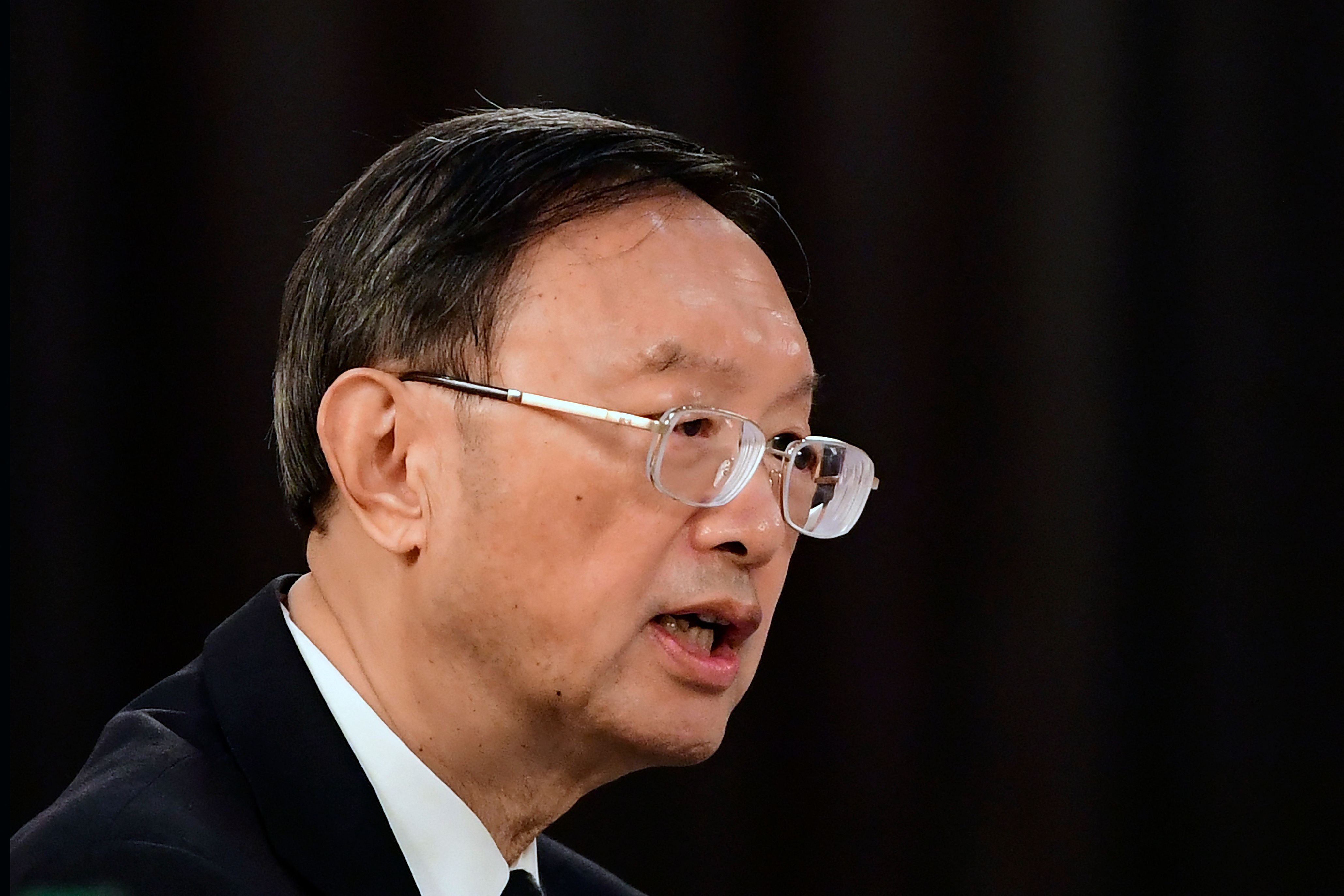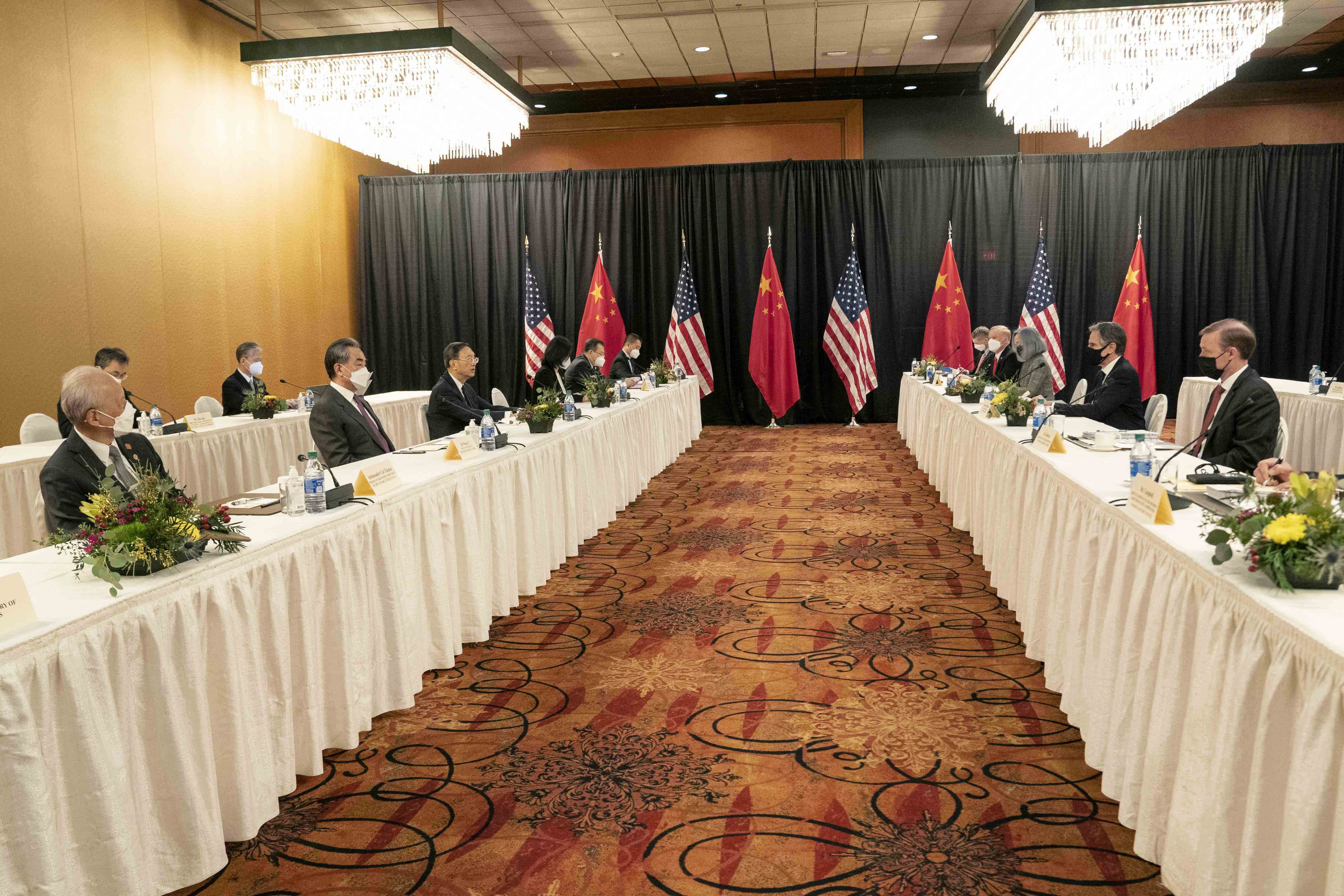United States-China talks sink to war of words
Beijing blames US for ‘strong smell of gunpowder and drama’
Your support helps us to tell the story
From reproductive rights to climate change to Big Tech, The Independent is on the ground when the story is developing. Whether it's investigating the financials of Elon Musk's pro-Trump PAC or producing our latest documentary, 'The A Word', which shines a light on the American women fighting for reproductive rights, we know how important it is to parse out the facts from the messaging.
At such a critical moment in US history, we need reporters on the ground. Your donation allows us to keep sending journalists to speak to both sides of the story.
The Independent is trusted by Americans across the entire political spectrum. And unlike many other quality news outlets, we choose not to lock Americans out of our reporting and analysis with paywalls. We believe quality journalism should be available to everyone, paid for by those who can afford it.
Your support makes all the difference.The first face-to-face talks between Chinese and US officials since Joe Biden took office descended into a war of words on Friday, intensifying troubled relations between the two nations.
Both sides traded sharp barbs in an unusually public way at the Alaska meeting, with the US accusing the Chinese delegation of “grandstanding” and Beijing firing back, saying there was a “strong smell of gunpowder and drama” that was entirely the fault of the Americans.
As the summit opened on Thursday, Antony Blinken, the US secretary of state, said the Biden administration was united with its allies in pushing back against Chinese authoritarianism.
In response, Yang Jiechi, the Chinese Communist Party foreign affairs chief, accused Washington of hypocrisy on human rights and other issues.
Mr Blinken said China’s actions “threaten the rules-based order that maintains global stability”, and Jake Sullivan, the US national security adviser, said China has undertaken an “assault on basic values”.
Mr Yang responded angrily, saying “there is no way to strangle China” and demanding the US stop pushing its own version of democracy at a time when the country itself has been roiled by domestic discontent.
Read more
He also accused the US of failing to deal with its own human rights problems and took issue with what he said was “condescension” from Mr Blinken, Mr Sullivan and other US officials.
“China will not accept unwarranted accusations from the US side,” Mr Yang said, adding that recent developments had plunged relations “into a period of unprecedented difficulty” that “has damaged the interests of our two peoples”.
Mr Blinken appeared to be annoyed by the tone and length of the comments, which went on for more than 15 minutes.
He said his impressions from speaking with world leaders and on his just-concluded trip to Japan and South Korea were entirely different from the Chinese position.
“I’m hearing deep satisfaction that the United States is back, that we’re reengaged,” the US secretary of state retorted.
“I’m also hearing deep concern about some of the actions your government is taking.”
Underscoring the animosity, the State Department criticised the Chinese delegation for violating an agreed-upon two-minute time limit for opening statements and suggested it “seem(ed) to have arrived intent on grandstanding, focused on public theatrics and dramatics over substance”.
“America’s approach will be undergirded by confidence in our dealing with Beijing – which we are doing from a position of strength – even as we have the humility to know that we are a country eternally striving to become a more perfect union,” it said.

Speaking later in Beijing, Chinese Foreign Ministry spokesperson Zhao Lijian said Mr Blinken and Mr Sullivan had provoked Chinese officials into making a “solemn response” after US officials made “groundless attacks” against China.
“It was the US side that ... provoked the dispute in the first place, so the two sides had a strong smell of gunpowder and drama from the beginning in the opening remarks. It was not the original intention of the Chinese side,” Mr Zhao said.
The meetings in Anchorage were a new test for ties between the two countries, which are at odds over a range of issues from trade to human rights in Tibet, Hong Kong and China’s western Xinjiang region, as well as over Taiwan, China’s assertiveness in the South China Sea and the coronavirus pandemic.
“We wanted to share with them the significant concerns that we have about a number of the actions that China has taken, and behaviours exhibiting concerns, shared by our allies and partners,” Mr Blinken said after the meetings concluded.
“And we did that. We also wanted to lay out very clearly, our own policies, priorities, and worldview. And we did that too.”
In separate comments, Chinese Communist Party foreign affairs chief Yang Jiechi said dialogue was the only way to resolve differences, but he also made clear that Beijing had no intention of backing down on any issue.
“China is going to safeguard our national sovereignty, security and our interests to develop China. It is an irreversible trend,” he said.
“We hope the United States is not going to underestimate China’s determination to defend its territory, safeguard its people and defend its righteous interests,” he said.

The Biden administration has yet to signal whether it is ready or willing to back away from the hard-line stances taken under Donald Trump.
Just a day before the meeting, Mr Blinken had announced new sanctions over Beijing’s crackdown on pro-democracy advocates in Hong Kong.
In response, China stepped up its rhetoric opposing US interference in domestic affairs and complained directly about it.
“Is this a decision made by the United States to try to gain some advantage in dealing with China?” State councillor Wang Yi said.
“Certainly this is miscalculated and only reflects the vulnerability and weakness inside the United States and it will not shake China’s position or resolve on those issues.”
Mr Trump had taken pride in forging what he saw as a strong relationship with Chinese leader Xi Jinping.
But the relationship disintegrated after the coronavirus pandemic spread from the Wuhan province across the globe and unleashed a public health and economic disaster.
Additional reporting by agencies
Join our commenting forum
Join thought-provoking conversations, follow other Independent readers and see their replies
Comments